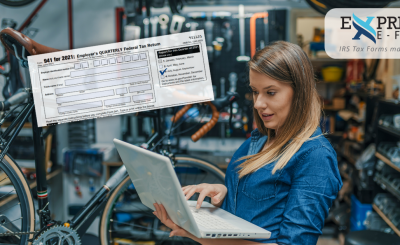Here is what to expect for Form 941 changes when you file for your third quarter.
During these times, there have been a lot of changes to make life safer. When it comes to filing your business’s taxes with the IRS, the Employer’s Quarterly Federal Tax Return, Form 941, has undergone some major updates. The revised Form 941 now reflects COVID-19 tax relief and allows employers to report refundable tax credits received under the Families First Coronavirus Response Act (FFCRA) and the CARES Act.
The IRS finalized this form on June 19, 2020. The updated Form 941 has 11 new lines and now supports qualified leave wages, Employee Retention Credit, requesting advances on refundable tax credits, and helps employers report deferred payments.
What’s new on the revised Form 941?
COVID-19 Qualified Leave
Under the FFCRA, employers are required to pay their employees qualified sick and family leave wages. These wages are eligible for refundable tax credits and are not subject to the Social Security portion of employment taxes. Form 941 changes let you report these credits easily. You can provide information about qualified sick leave wages on Line 5a(i) of the updated Form 941 and information about qualified family leave wages on Line 5a(ii).

Employee Retention Credit
Employee Retention Credit incentivizes eligible employers to keep employees on payroll by granting them refundable tax credits for up to 50% of qualifying employee wages paid between March 12, 2020 and January 1, 2021, with a cap of $5,000 per employee. The revised Form 941 lets employers report their qualifying wages and get their employee retention credit.
Click here to learn more about how Employee Retention Credit can help you keep your team together and save your business money.
Advanced Tax Credit Payments
Employers who are eligible for employee retention credit or qualified sick or family leave can file Form 7200 to request an advance on those credits. Form 941 changes allow employers to report any advances to the IRS.
Find out more about COVID-19 tax relief and IRS Form 941 changes here.
Deferred Tax Payments
Eligible employers can use their tax credits ahead of time by deferring the appropriate amount from the Social Security portion of employment taxes. Deferred tax credits need to be reported on the revised Form 941.
IRS Form 941 Instructions
The IRS is updating four lines on Form 941 for the third and fourth quarter deadlines to accommodate employers’ needs. The revised Form 941 will take into account that employers can defer the employee portion of Social Security taxes on wages paid between September 1 and December 31, 2020.
In addition to providing a draft ahead of time so everyone would be prepared, the IRS released instructions with the newly updated Form 941. Visit our guide to the new lines on Form 941 for simplified steps.
For more information about FFCRA and CARES Act related Form 941 changes, click here.
E-file the Updated Form 941
As employers navigate tax relief options and new lines on IRS Form 941, it can be good to have safeguards in place. As a trusted e-file provider, ExpressEfile is here to offer friendly, 100% U.S.-based support over live chat or email. You’ll get reliable answers about all the new IRS requirements and fields on your return. Our software also checks all your information for errors and discrepancies before submitting it to the IRS, so you can meet your 941 deadline effortlessly and without mistakes.
When it’s time to file the updated Form 941 for your third quarter, we’re here to help.





